Despite taking the top awards at the 2011 Oscar Ceremony, or perhaps because of that, I was in no hurry to see director Tom Hooper’s The King’s Speech, although I had thoroughly enjoyed his previous film The Damned United written by Peter Morgan and starring Michael Sheen as the renowned bombastic soccer manager Brian Clough. For some reason I had supposed that it would be a typically turgid period piece but after watching the Blu-ray release I was pleasantly surprised to find it terribly gripping and incredibly well written and performed by a marvellous ensemble cast.
Colin Firth is not an actor I’ve ever tended to warm to in the past and I’ve always felt he usually appears to be playing himself on screen, here however, not only is he portraying a notable historic figure, Prince Albert Duke of York, the future King George VI the present Queen’s father, but also he is encumbered with a pronounced stammer which Firth captures in excruciating detail. You would think that such a severe speech impediment would handicap an actor’s ability to communicate with the audience but, on the contrary, Firth is able to convey so much more through his palpable frustration and outbursts of temper as the irascible Albert than he’s ever been able to display in his largely predictable romantic lead roles.
It’s hard to imagine that the part of Lionel Logue could have been written for anyone other than Geoffrey Rush but again one has to remember that this isn’t a fictional character; the real life Logue was indeed a Shakespeare enthusiast and amateur actor, these elements weren’t simply concocted by writer David Seidler in order to play to Rush’s strengths as a performer. Logue was a former elocution teacher in Australia who treated the returning soldiers from WWI whose impaired speech was a result of shell-shock. He emigrated to England with his family in 1924 and started a speech defect practice in Harley Street which was recommended to Albert’s wife Elizabeth, played by Helena Bonham Carter. Despite being demoralised from the experience of many failed cures the Prince reluctantly agrees to try the treatment.
The film charts Logue’s unconventional methods of healing the future King, insisting that during the consultations that they are equals and that he shall call him nothing but ‘Bertie’ an intimate family pet name. Initially Albert meets Logue with querulous defiance, he never expects to be crowned King as his older brother David (Guy Pearce) is the natural heir to the throne, however matters beyond his control are shaping his destiny; close advisers including Prime Minister, Stanley Baldwin (Anthony Andrews) and Chancellor of the Exchequer, Winston Churchill (Timothy Spall) are speculating on Hitler’s ambition to conquer Europe and believe that war is inevitable. When King George V (Michael Gambon) dies in January 1936, David ascends the throne as Edward VIII but his reign only last 10 months as his commitment to marry the American divorcee Wallace Simpson is at conflict with the constitution leaving him no choice but to abdicate.
As King George VI ‘Bertie’ is required to make public addresses which means persevering with Logue, the only man whose approach has achieved demonstrable improvement in his ability to speak. The strength of the film lies in the scenes between them as they develop an unlikely friendship despite being from completely different social backgrounds; one reticent and self-doubting the other outspoken and assured. After coaching the King successfully through his coronation Logue’s biggest challenge is to prepare him for his first radio speech to be broadcast around the world after the declaration of war with Germany, he has to provide the nation with resolute and reassuring words at a time of conflict.
Visually the film is very well put together from the attention to detail on display in the exquisite 1930s production design to the choice of an unusual, almost ‘fish-eye’ lens to illustrate Bertie’s feelings of isolation and constriction which are echoed in the use of fog in the few exterior shots. The image is presented in full 1080p with strong contrast and plenty of detail visible in hair and skin tones, although occasionally the colour palette seems unnecessarily muted. The DTS-HD 5.1 soundtrack perfectly balances the prominent dialogue and accompanying musical score, much of which is comprised from a selection of classical works, the most effective being the use of the 2nd movement of Beethoven’s 7th Symphony to support the King’s climatic radio transmission.
The King’s Speech is a deserved award-winning historical drama and a rare one in that it fails to be boring or sentimental, particularly evident in its depiction of the Wallis Simpson affair which is more often than not simply presented as a fairy tale romance in screen adaptations. Both Colin Firth and Geoffrey Rush are outstanding in their central lead roles and they are well supported by a uniformly assured company of character actors. David Seidler’s script is not only impeccably researched but solidly dramatised; he and director Tom Hooper have transformed what could have just been two men talking in a room into compelling cinematic viewing.

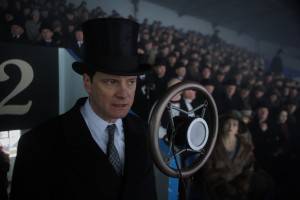
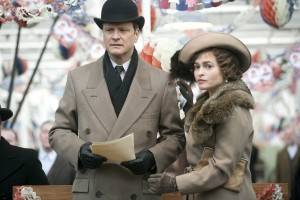
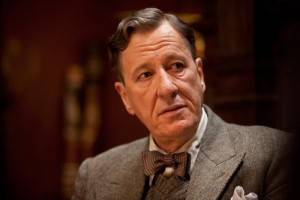
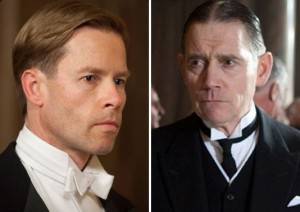
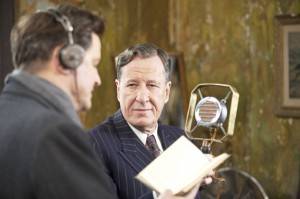
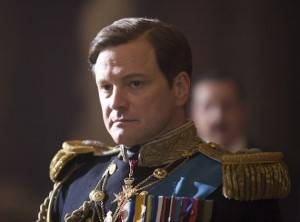
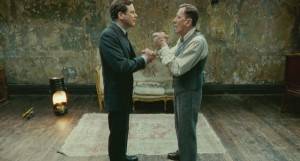
One thought on “The King’s Speech”
The movie was excellent…but whoever put together the Special Features DVD needs to be fired. Twice Anthony Andrews is mentioned and twice a clip of the WRONG actor is shown. Andrews played the Prime Minister who resigned. Where the heck were the editors for the DVD extra? Bad. Very bad.
Comments are closed.